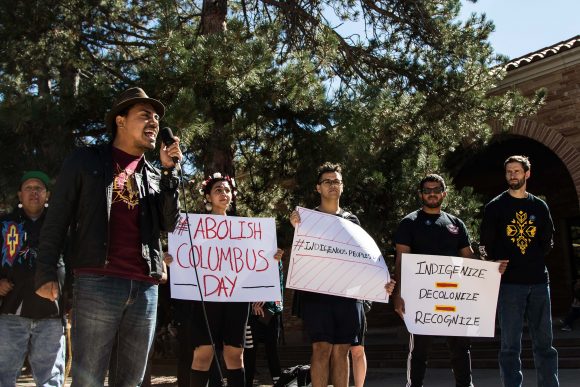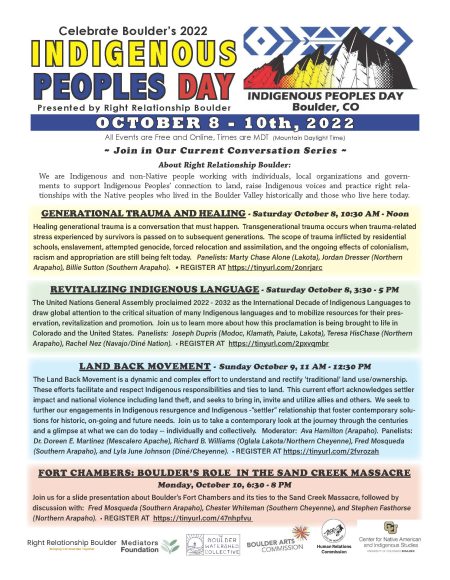
Jozer Guerrero preforms a spoken word poem during Indigenous People’s Day on Oct. 12, 2016. (Jackson Barnett/CU Independent File)
Since the late 1900s, many states have been replacing Columbus Day with Indigenous Peoples Day, a day meant to honor those living in America before and after Christopher Columbus arrived. Boulder joined this movement in 2016 after a resolution, brought to city officials by community members and Indigenous leaders, was signed.
The holiday Indigenous Peoples Day seeks to replace, Columbus Day, has been seen as controversial because of Christopher Columbus’ record of slavery and colonization when he arrived in the Americas.
The program manager at the Center for Native American and Indigenous People Studies, Cibonet Salazar, said many people were involved in changing the focus of this day in Boulder.
“Right Relationships Boulder, The Native American Rights Fund and several community members worked together to create the Indigenous Peoples Day resolution to replace Columbus Day in the city of Boulder,” Salazar said.
In 2016, a committee including those community members and some Indigenous leaders created a resolution to establish Indigenous Peoples Day in Boulder. In response, city officials authored a commitment that recognized Indigenous people and resolved to celebrate Indigenous Peoples Day on the second Monday of each October. Boulder had not officially recognized Columbus Day in the past so its Indigenous Peoples Day didn’t replace anything for the city.
Nikhil Mankekar, former chairman of the City of Boulder’s Human Relations Commission, served on the committee that drafted the Indigenous Peoples Day resolution.
“The document is very honest about local history, including the Sand Creek Massacre, and is unique in that it contains specific commitments from the city to Indigenous people regarding historical accuracy, renaming of monuments and access to local land,” Mankekar said.
The commitment from the city is not only celebrating Indigenous Peoples Day, but also honoring and making space for the Indigenous people and tribal leaders in Boulder.
Mankekar explained the importance of the follow-up work that came after the resolution was signed.
“For me, this meant leading and taking on the heavy lifting in the years after the resolution was signed to make sure the city walked its talk,” he said.
Boulder is setting an example for other communities who might want to recognize Indigenous peoples with the city’s resolution and culturally competent work.

The city had its first Tribal Consultation in 2019, which led to changing Settlers Park, located on Pearl Street, to Peoples’ Crossing, to recognize and honor the area as a crossroads for Indigenous peoples who lived in the Boulder area.
To celebrate Indigenous Peoples Day and the history in Boulder, there are several events happening around the city.
“CNAIS is co-sponsoring many of the events this week with Right Relationships Boulder, NARF and the CU [Boulder Law School],” Salazar said.
A virtual event will be held on Monday, Oct. 10 called, “Current Conversations, Fort Chambers: Boulder’s Role in the Sand Creek Massacre.”
A slide presentation will be presented that ties Boulder’s Fort Chambers to the Sand Creek Massacre. Register for the Zoom here.
On Wednesday, Oct. 12, at 6 p.m., there will be an “Indigenous Youth and Human Rights” presentation at the Wolf Law building on campus to discuss the law behind Indigenous rights. For more info, go to the City of Boulder’s website.
The work that the Human Relations Commission and resolution committee did for Indigenous peoples in Boulder set the foundation for the city to recognize Indigenous peoples who lived or traversed on land Boulder now occupies.
Contact CU Independent Staff Writer Addison Luetke at Addison.Luetke@colorado.edu.
